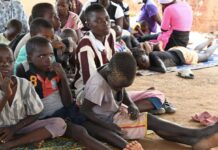Efua Rose
Former president of Nigeria, Chief Olusegun Obasanjo, in a statement lamented about the fate of 14 million Nigerian children presently out of school, as he says lack of education is one of the biggest problems withholding the nation’s development.
Speaking as the chairman of the convocation ceremony of Chrisland University, Abeokuta, Obasanjo disclosed that 14 million children that are supposed to be in school are rather out in the streets.
He further said this should be a source of worry to whoever is concerned with the development of the country and Africa at large.
“We have 14 million children that should be in school and are not in school and that’s more than the population of many African countries,” he said.
However, he urged the graduating students to remain focused in spite of the difficulties in Nigeria, adding that, there are still opportunities out there that they could make good use of to be great in life.
The Vice-Chancellor of the institution, Prof Chinedum Peace Babalola, congratulated the 28 graduating students being awarded Bachelor degrees and professional certificates in entrepreneurship, saying that their training in the university had also equipped them with skills for self-employment.
Prof Babalola said that among the 28 graduates, five of them who are all females made First Class while Folashade Kikelomo Mary, with a CGPA of 4.80 from the College of Natural and Applied Sciences, emerged as the overall best graduating student.
She said the university had instilled in the students entrepreneurial skills that would turn them into job creators and not job seekers and added that the University management was proud of the number of graduates who have been part of the university’s history.
The guest speaker at the convocation ceremony, Commissioner for Human Resources, Science and Technology, African Union, Prof Sarah Anyang Agbor, charged African leaders to have a strong political will to ensure sustainable growth and impact the people for good.
Agbor, who rose to deputy vice chancellor before her engagement with the Africa Union, said education and leadership are key factors in development.
“For education to thrive in this society, we need to do a kind of tripartite actions, tripartite strategic linkages between the government and its policies, the academic and the private or the public sector.
“The theme of my convocation lecture is leadership, sustainable development and nation building in African: a reflective perspective. The quality of leadership brings about sustainable development and therefore, sustainable development brings nation building, so we speak of good leadership that put into consideration,” Agbor said.
She canvassed for African solutions to African challenges making reference to the Agenda 2063 of ‘The Africa we want’.











